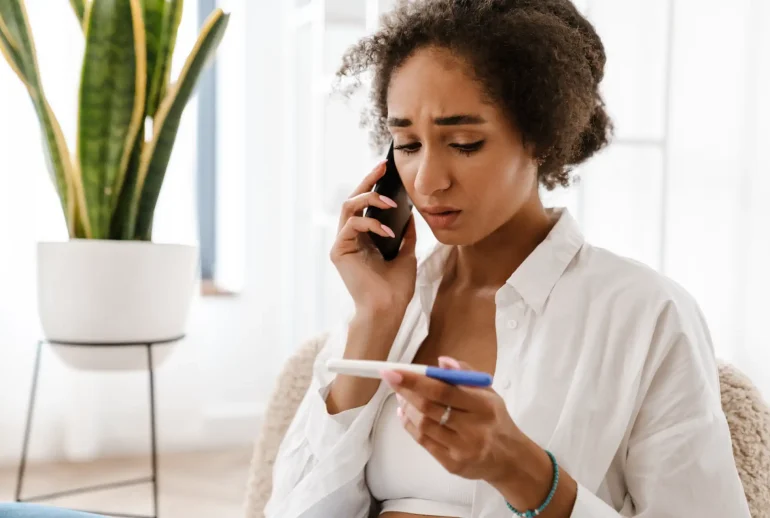Negative Pregnancy Test? Still Think You’re Pregnant — What Doctors Say
Got a negative pregnancy test but still think you’re pregnant? You’re not imagining things — and you’re not alone. Many women experience clear pregnancy symptoms despite negative results. But what’s actually happening, and when should you worry?
Let’s break down what doctors say about false negatives, what could be causing the confusion, and when to get retested or see a professional.
Can You Get a Negative Pregnancy Test and Still Be Pregnant?
Yes — this happens more often than you’d think. A negative pregnancy test doesn’t always mean you’re not pregnant. Several factors can affect the test’s accuracy:
- You tested too early
- Your urine was too diluted
- You have a medical condition interfering with hormones
- The test was expired or defective
Most pregnancy tests detect the hormone hCG (human chorionic gonadotropin). But if your body hasn’t produced enough of it yet — or if it’s hard to detect in your urine — the test could show a false negative.
Still Think You’re Pregnant After a Negative Test? Look for These Symptoms
Here are common pregnancy symptoms doctors watch for, even when test results are negative:
- Missed or late period
- Morning sickness or nausea
- Fatigue or unusual tiredness
- Breast tenderness or changes
- Cramping without bleeding
- Frequent urination
If you’re experiencing several of these signs — and they’re unusual for your cycle — you may still be in early pregnancy.
Why a Negative Pregnancy Test Might Be Wrong: Medical Reasons Explained
1. Testing Too Soon After Conception
This is the #1 reason for false negatives. After fertilization, your body may take up to two weeks to produce enough hCG to be detected. Doctors recommend waiting at least one week after your missed period before testing.
Learn more in our post on the best time to take a pregnancy test.
2. Diluted Urine Affects Accuracy
If you drink a lot of water before testing, the hCG in your urine may be too diluted to detect. Always test using your first-morning urine for the most accurate results.
3. Irregular Ovulation or Late Implantation
Ovulation doesn’t happen on a perfect schedule. If you ovulated late this cycle, implantation (and hCG production) might be delayed too — causing a negative result even if you’re pregnant.
4. Faulty or Expired Test
An expired or damaged pregnancy test might not work properly. Always check the expiration date and follow instructions carefully.
5. Medical Conditions That Disrupt Hormones
Conditions like PCOS, thyroid disorders, or perimenopause can cause symptoms similar to pregnancy — and irregular cycles that throw off testing.
If your symptoms persist but tests remain negative, talk to your doctor about a blood test or ultrasound.
Doctor Advice: When to Retest After a Negative Pregnancy Test
Doctors recommend retesting if:
- You tested before your missed period
- You didn’t use first-morning urine
- Your symptoms are increasing or changing
If your period is more than two weeks late, schedule an appointment. Your doctor may recommend a quantitative blood test to check exact hCG levels or a transvaginal ultrasound for confirmation.
False Negatives: Can You Still Be Pregnant If the Test Says No?
Call your doctor or seek emergency care if you experience:
- Severe lower abdominal pain
- Dizziness or fainting
- Unusual bleeding or spotting
These could be signs of an ectopic pregnancy, which requires immediate attention. Learn more from ACOG’s guide on ectopic pregnancy.
What Doctors Say: Trust Your Symptoms, But Confirm With Testing
Doctors stress this: a pregnancy test is just one tool. If your symptoms strongly suggest pregnancy — especially if they’re new for you — trust your body and follow up.
It’s also possible to misinterpret symptoms caused by stress, hormonal imbalances, or cycle changes. That’s why tracking your cycle and symptoms is helpful for your doctor.
Final Word: What to Do If You’re Still Unsure
If you have a negative pregnancy test but still think you’re pregnant, here’s a quick checklist:
- Wait 3–5 days and retest using first-morning urine
- Track symptoms like nausea, fatigue, or breast changes
- Use a different test brand or digital test for clarity
- Contact your doctor if symptoms persist or worsen
Also check out 7 reasons your test might be wrong even if you’re pregnant for deeper insight.
And remember: false negatives are frustrating but common. You’re not overthinking it — you’re being smart about your health.
For medical accuracy on home testing, visit the Mayo Clinic’s guide to pregnancy tests.
